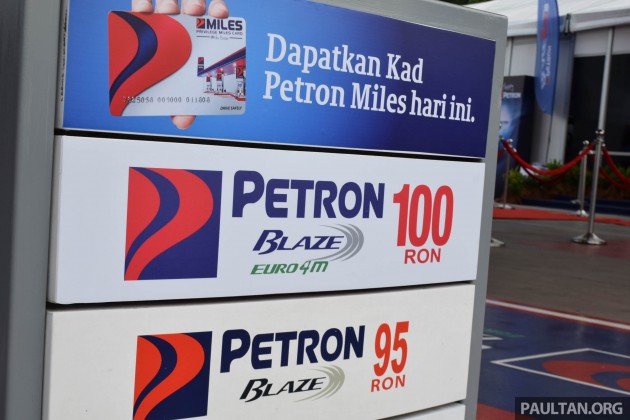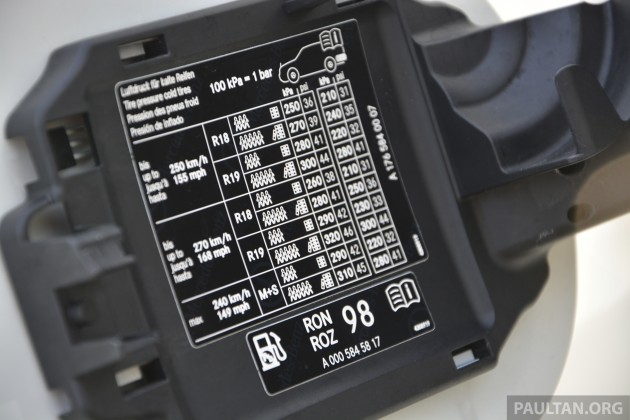The launch of Petron Blaze 100 Euro 4M fuel in Malaysia has raised the interest and curiosity of many drivers. Aside from the price, which has attracted its own set of supporters and detractors, many have asked about the possible benefits, and curiously, the drawbacks of using RON 100 on a regular basis.
Among the many questions are whether the increased octane number will harm the engine, or the engine needs re-tuning. The answer, as with many things car related, is both simple and hard.
Let’s go back to chemical engineering 101 for a moment. RON stands for Research Octane Number. This number represents the ‘knock-resistance’ of the fuel. Knocking is the car world’s slang term for premature ignition or detonation.
This is when fuel in the combustion chamber ‘explodes’ before it is supposed to, giving rise to a ‘knocking’ or ‘pinging’. This is not a good thing in combustion engines, especially those running on petrol. A holed piston is the usual result, with the expensive overhaul that follows.
High performance engines, running high compression ratios, are prone to detonation when using low RON fuel. It might also be surprising to learn that older, low compression engines are also prone to detonation, but the reasons why they happen are different.
Most modern engines, with Programmable Fuel Injection (PGM-FI), are able to run on RON numbers as low as 88, and as high as 103. But, if the manufacturer classifies the engine as high performance, with high-compression pistons or a turbocharger, a minimum RON will be specified to prevent detonation, and damage to the engine.
For an older engine, running on carburettors, detonation occurs with low RON fuel because carbon build-up in the combustion chamber allows ‘hot-spots’ to develop, creating conditions where detonation can occur, especially on a hot day and under load.
The ECU will take readings from the knock sensor when detonation occurs, and retard or advance the ignition timing accordingly. There is a limit to the level of adjustment, of course, hence most manufacturers will put a little sticker on the inside of the fuel-filler cap saying the minimum fuel the engine will take.
Another thing is the calorific capacity, or the energy contained in the fuel and released when it is burned, is specific. Hence, the amount of power available from burning the fuel is a finite number, and RON has no bearing on that.
What is intended with high RON numbers is the ability to run the engine at high compression ratios and advanced ignition timing. However, a high compression ratio usually means a very small combustion chamber volume, which leads to detonation.
So, does a normal, normally-aspirated, four-cylinder family sedan require RON 100 petrol? Probably not, because the cost of fuel will outweigh the the possible benefits of the possible power increase. Not all modern turbo engines will require high RON fuel either, because the boost pressure, sized for efficiency rather than performance, does not need it.
Will the ECU need re-flashing or the engine re-tuned because there’s RON 100 in the fuel tank? Again, probably not, because the ECU will advance the ignition to the brink of detonation, and no more. Once it reaches the limit of advance, the rest of the RON 100 will simply be blown out the exhaust as un-burnt fuel (which is another bad thing in and of itself).
The benefit of running RON 100 is primarily for very high-performance engines, or performance motorcycle engines, where heavy loads are placed on the high-compression engine that allow it to produce huge hp figures.
While using a lower RON fuel in a high performance engine may cause reliability issues in the long run or a loss of power, what will not happen is damage to the engine because of using RON 100 fuel or any higher RON than what is recommended. Nor is there any necessity for engine tuning, unless running a highly-modded engine, or the engine’s manufacturer calls for it.
The long and short of it is, high performance engines may benefit to a higher degree from using fuel with a higher RON number, while the perceived increase in performance will not be as noticeable in a less powerful engine.
As for those who think using RON 100 will damage your engine, science says otherwise.
- Source: paultan.org














